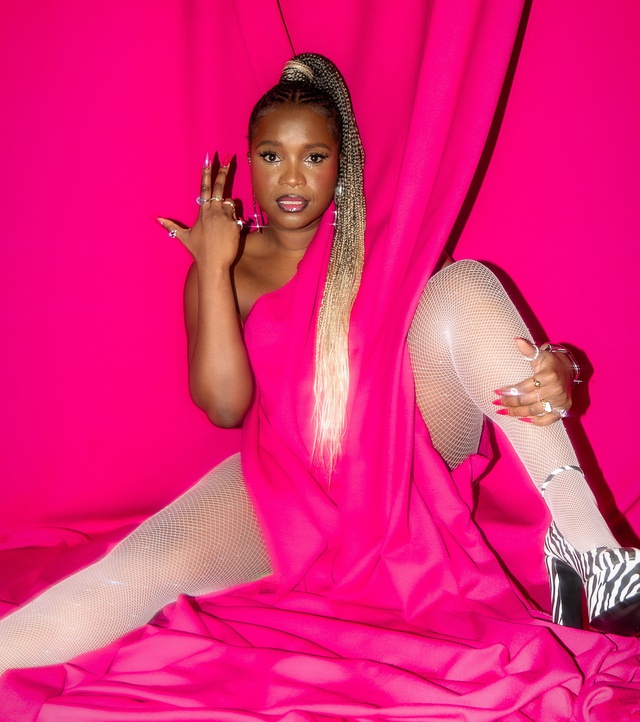A Journey To Femme-ness & Queer Femininity In Performance
19.06.24
Temi Wilkey is an actor, writer & bisexual icon. Her debut play, The High Table won the Stage Debut Award for Best Writer in 2020. She also co-founded & co-directed the Drag King company, Pecs, performing in their sell-out shows at venues including The Yard, Soho Theatre & Tate Britain before leaving the company in 2019. Her debut solo show Main Character Energy is having its world premiere this year at the Edinburgh Festival Fringe.
Instagram: @temi.wilkey
Her piece is the third in a series on queer performance. Read the first piece by Zoe Paskett here and the second by Jodie Mitchell here.
“You never wore dresses as a child.”
This is what my mother said to me on the day I came out… after saying that she always thought I might be queer. I felt a strange shame and confusion when she said this. Mainly because, as a friend affirmed at the time… it simply wasn’t true. I’ve always relished in my femininity, taken great pleasure in it and taken great pains to access it. But what my mother said set an unconscious precedent for my relationship to my femininity and what I thought queerness could look like.
When I co-founded Pecs: The Drag King Company and began co-directing and performing in the company’s shows, I felt like I was celebrating my queerness. Exploring and expressing my masculinity onstage felt powerful. The shows we made created space for queer women & non-binary people to gather, to feel seen and to feel sexy. And it often got me laid. But when I would step offstage, my real self was very different to my hyper-masculine alter ego, Drag King Cole, and I couldn’t help but feel like the many people I pulled after our gigs didn’t want to be sleeping with me, but with him.
For many people, drag performance is an extension or a heightened expression of their own gender identity. But, for me, Drag King Cole was very firmly an alter ego - another side of myself that was exciting and empowering to put on for the evening but wasn’t an expression of who I was.
I was used to playing boys. I was always cast as male parts in my school plays and in my university theatre days. When I performed as Drag King Cole I was not only expressing what I thought represented my queerness but I was also reclaiming the roles that had often been thrust upon me from when I first developed my love of performing. But those were never the roles I wanted. I wanted to play Helena in A Midsummer Night’s Dream or Maria in The Sound of Music or Viola or Sandy or Rosalind. I never wanted to be shunted in the male and often small, supporting roles that I got cast in.
Something I’ve been reckoning with since leaving the white institutions that I grew up is that I may not have been cast in the roles I wanted because I never fit into the standards of what traditional femininity looked like. What that looked like was white and I was not.
In her extraordinary book, Thick and other essays, Tressie McMillan Cottom discusses beauty and its sociological relationship to blackness. She writes:
“Beauty isn't actually what you look like; beauty is the preferences that reproduce the existing social order.”
When that social order is within white supremacy: “beauty’s ultimate function is to exclude blackness.”
Beauty and femininity have an inextricable relationship within this social order. If you are not deemed as beautiful then you can quickly be dispossessed of your femininity. You can and will be routinely hyper-masculinised by society. We see this in the way many dark-skinned celebrities like Serena Williams, Michelle Obama and the hot girl herself, Megan Thee Stallion are treated within the media.
I thought, when I was performing in Pecs, I was reclaiming the roles I had been routinely cast in. But, in actuality, I was simply recreating them. I loved exploring the performance of gender, I loved the shows we created and I am so proud of the company and its ongoing legacy since I’ve left. But it feels so much more aligned for me to now be developing a debut solo show that revels in my femininity.
Main Character Energy is high femme. When I first came out I didn’t see much representation of queer women full stop. But when I did, they were usually butch. At the time it felt like, as my mother implied, the only way to be a queer woman was to be somewhat masculine. So I shaved my head and started doing drag. Rediscovering my femininity and discovering, for the first time, how that intersected with my queerness was huge. It helped me step into myself, into my power, into my Main Character Energy. It won’t do that for everyone. But it did for me because it’s true to who I am. Who I’ve always been. But wasn’t ever given space to be, especially not onstage.
It’s been magical bringing the queerness in theatrical form that I discovered from years of making shows with Pecs to Main Character Energy. It’s camp, it’s self-indulgent, it is unapologetically femme and it feels so right.
If you'd like to keep up to date with all our blog posts, important and interesting stories in the worlds of theatre, arts and media, plus job ads and opportunities from our industry friends, sign up to our daily media briefing at this link.



